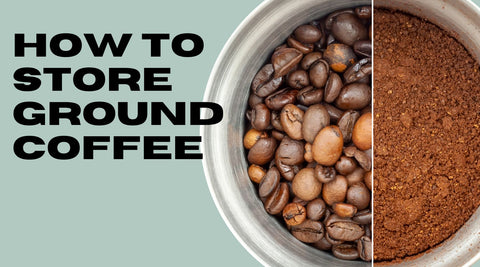Whether you roast and grind your own coffee at home or whether you prefer the convenience of buying a pack of ground coffee in the grocery store, there's always the issue of storage. Coffee loses freshness as soon as it's been run through a grinder.
This means that the quality of your coffee beans or grounds depends on how well you store them. Ground coffee needs proper care to preserve its flavor, aroma, and freshness.
In this article, we'll explore ten essential tips on how to avoid improperly stored coffee and keep your morning cup tasting fresh all the time.
10 Things You Can Do To Keep Ground Coffee Fresh For Longer
1. Buy or Grind Only as Much Coffee as You Need
The first tip is simple: Don't buy or grind more coffee beans from coffee shops than you need. Buying so much ground coffee is tempting when you see it on special somewhere. Sometimes, big packs of ground coffee beans cost less money when you compare the price per 100g - but is it worth it when you can only enjoy half of it because the other half of the pre-ground coffee went stale?
Of course, suppose you buy vacuum-sealed bags of freshly ground coffee and do not open them. In that case, they will last for a while - but as soon as you open them, the quality will degrade rapidly, especially if you haven't thought about storing coffee properly.
2. Re-Seal Your Bean Coffee Bag Properly
If you have no other containers or, for some reason, prefer to keep your bean coffee in its original bag, you have to make sure to re-seal it tightly after each use. You can use clips or twist ties to minimize air exposure and keep your coffee grounds reasonably fresh.
Some coffee brands sell their coffee grounds in re-sealable bags, which is handy, but you need to remove as much air as possible from the bag before you close it again. It's not the best solution, but it's okay, especially if you go through your ground coffee quickly (i.e., if you use up a sealed bag within one to two weeks).
3. Mind the Surface Area when Storing Coffee Beans or Grounds
The more the coffee's surface area is exposed to air and light, the faster your coffee degrades. That's why it's best to use storage containers that closely match your coffee quantity to minimize air contact.
Example: You have 100g of coffee and put them in a container that can hold up to 1kg of coffee. That's not ideal, as you most likely won't have the equipment to remove the excess air from the container.
4. Avoid Plastic Containers to Store Coffee
Plastic containers are easy to find, cheap, and convenient but are not the best choice for storing coffee. The problem here is that plastic can absorb odors and flavors, even if you do your best to clean it. This means that the container will, over time, have a negative effect on your coffee grounds, especially if you tend to switch up the type of coffee you use. It is better to use better materials like ceramic or stainless steel.
5. Invest in Airtight, Stainless Steel Containers, or Ceramic Containers to Store Coffee
Store your ground coffee in a good quality, air tight container if you want to keep it fresh longer. Airtight containers prevent exposure to air. Choose containers with a strong seal to lock in the flavor and aroma of your coffee grounds.
Ceramic and stainless steel containers are excellent for storing ground coffee. A good opaque container provides airtight storage and protects your coffee from light, which can negatively impact its flavor.
6. Vacuum Seal for Maximum Freshness during Coffee Storage
If you can access it, vacuum sealing is a game-changer for storing ground coffee. Vacuum sealing removes air from the container. This, in turn, slows down the oxidation process that degrades the quality of your coffee. If you go through coffee grounds slowly and often have issues with stale coffee, investing in a small vacuum sealer is worth the cost.
7. Mind the Roast Date
All of your efforts will be of little use if you buy coffee that’s already past its best when you buy it. Coffee is at its best within a certain timeframe from the roasting date. You should purchase freshly roasted coffee whenever possible (which can be tricky if you buy from a grocery store). Buying direct from our roaster ensures the roast date is stamped on the box.
Generally, it’s best to use coffee grounds within two weeks after the roast date.
8. Preferably, Do Not Freeze Ground Coffee
Some people will recommend freezing coffee. Some coffee websites even tell you it's an awesome idea. It isn't; unless you're 100% sure that you know what you're doing. For most people, frozen ground coffee is not a good idea because most people just don't get it right, and the coffee ends up with freezer burn or tasting funny. You can make too many mistakes when storing ground coffee in a freezer.
There's a lot of moisture inside a freezer, and while it's always pretty cold, there are temperature fluctuations whenever you open and close the freezer. Moisture isn't good for coffee grounds (apart from when you brew them).
You can freeze coffee beans, but you need the right equipment and know how to do this properly.
9. Also, Stay Away from the Fridge
Refrigerator temperatures are also not suitable for coffee storage. Coffee tends to absorb odors in the fridge, making your coffee taste funny. And just like a freezer, there's plenty of moisture in a fridge.
Coffee must be stored in a cool (not cold or freezing), dark place, away from temperature fluctuations and potential contamination.
10. Pantry Shelf or Kitchen Cupboards
So, if it's neither the freezer nor the fridge, that leaves the pantry or a kitchen cupboard. In pantry storage, the coffee will usually be in a safe, i.e., cool and dark, environment, making it the perfect location for your coffee grounds, either in an airtight container or a properly sealed coffee bag.
The most important thing is a consistent temperature (because moisture forms when there are constant temperature changes).
Conclusion: Proper Storage For Lovely Fresh Coffee Isn’t Difficult
Storing coffee isn't particularly challenging. You need to invest in the right container, which is generally not very expensive, or seal the original packaging properly.
The most important thing is to keep coffee away from air, moisture, fluctuating temperatures, and light. As long as you keep these things in mind, storing your coffee grounds should not be difficult. A perfect cup of coffee is worth a tiny bit of effort!



